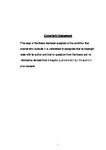Applications of spice extracts and other hurdles to improve microbial safety and shelf- life of cooked, high fat meat products (doner kebab)
| dc.contributor.supervisor | Kuri , Victor | |
| dc.contributor.author | Al-Kutby, Sahar | |
| dc.contributor.other | Faculty of Science and Engineering | en_US |
| dc.date.accessioned | 2012-09-05T08:06:20Z | |
| dc.date.available | 2012-09-05T08:06:20Z | |
| dc.date.issued | 2012 | |
| dc.date.issued | 2012 | |
| dc.identifier | 10131502 | en_US |
| dc.identifier.uri | http://hdl.handle.net/10026.1/1184 | |
| dc.description.abstract |
There is a growing demand for safe and convenient meat products. The effect of natural spice extracts incorporated with other hurdles for controlling pathogenic bacteria and extending the shelf life of RTE doner kebab were investigated. A comprehensive literature review was undertaken to establish the status of microbial risk, use of additives, knowledge on oxidative deterioration and HACCP associated with meat products. The in vitro antioxidant and antibacterial activities of spice extracts were screened and compared. Cinnamon, clove, and sumac alcoholic extracts demonstrated strong antimicrobial effect, however, rosemary proved effective as antioxidant in a lamb fat model. An accelerated shelf life study on a model system indicated that storage temperature was the most critical factor affecting lipid oxidation, which was effectively delayed by vacuum packaging and rosemary extracts. The effects of spice extracts, packaging and storage time on physiochemical, microbiological, and sensory attributes of doner kebab were evaluated. Application of rosemary and cinnamon extracts significantly reduced TVC, inhibited LAB, and retarded lipid oxidation rate. Sensory evaluation by a consumer panel indicated that only taste and spiciness perception was significantly different between treatments. A challenge test against Listeria monocytogenes showed significant differences between control and spice treatments at day 28. Strong inhibitory effects were associated to high levels of cinnamon particularly when applied after cooking. The effect of heat treatment and sumac (Rhus coriaria) on Bacillus cereus and Clostridium perfringens inactivation was evaluated on a doner kebab prototype. Addition of sumac significantly reduced D-values and z-values for both organisms in comparison to the control. The investigation of the effect of spice extracts, and environmental conditions on changes in growth kinetic parameters for L. monocytogenes and Salmonella Typhimurium showed that spice extracts are highly significant. For both microorganisms, Mumax was reduced as salt and spice concentrations increased, and pH levels decreased. This study shows that spice extracts incorporated with other hurdles can help to maintain safe and good quality RTE doner kebab. | en_US |
| dc.description.sponsorship | Iraqi ministry of higher education and scientific research | en_US |
| dc.language.iso | en | en_US |
| dc.publisher | University of Plymouth | en_US |
| dc.subject | Food Borne Pathogen | |
| dc.subject | Food Safety and Quality | |
| dc.subject | Spice Extract | |
| dc.subject | Doner Kebab | |
| dc.subject | Shelf-life | |
| dc.subject | Microbial Risk Assessment | en_US |
| dc.title | Applications of spice extracts and other hurdles to improve microbial safety and shelf- life of cooked, high fat meat products (doner kebab) | en_US |
| dc.type | Thesis | |
| plymouth.version | Full version | en_US |
| dc.identifier.doi | http://dx.doi.org/10.24382/3301 |
Files in this item
This item appears in the following Collection(s)
-
01 Research Theses Main Collection
Research Theses Main


